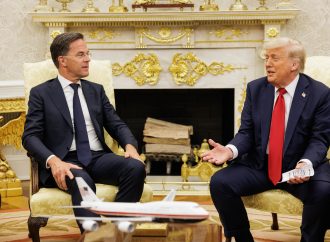It’s time to vote for the winner of the CIPS Best Blog Award! The CIPS Best Blog Award is designed to recognize the best blog written by the CIPS community during the previous academic year. This is the sixth year that we will be giving out the award.
The 2025 award will go to a blog that was written between June 2024 and May 2025. During that period, we published 53 blogs on a wide variety of topics, including NATO, Israel’s “Iron Wall”, outer space diplomacy, Trump repoliticizing the global economy, Science Diplomacy, tariffs, Canada’s Africa strategy, and much more.
We hope that you have enjoyed and appreciated reading them as much as we have. Voting is now open and will close on Friday, September 26.
CIPS will donate $300 to an organisation of the winner’s choosing.
The full list of 53 blogs was narrowed down to a top five by our judge, Madelaine Drohan, who kindly read through each of the blogs and evaluated them based on the following criteria:
- The importance of the policy issue discussed
- The originality of the academic insight it provides
- The quality of the argument and the quality of the writing
We’re thankful for the time and energy that Madelaine put into this task, and for the short list that she has provided. Read more about Madelaine below.
The shortlist is as follows:
A Response to Our Critics – Re: Can Canada-U.S. Defence Ties Survive Trump?
By Peter Jones and Philippe Lagassé
On March 21, we published an op-ed in the Globe and Mail arguing that Canada had to become less reliant on the United States in matters of national defence. We held that Canada should rely more on itself and build new partnerships and alliances. Since the op-ed was published, we have had pushback from many serving and retired military officers. Most of the feedback has focused on the need to stay the course on the F-35 fighter, which we did not address in the op-ed. But there is usually expressed a more general underlying sentiment that the defence relationship with the United States is too important and too inevitable for Canada to seriously question.
The 2% NATO Defence Spending Target is Not Evidence-Based Policymaking
By Cesar Jaramillo
With Donald Trump’s recent election victory in the United States, pressures on Canada to boost military spending to meet NATO’s 2% GDP target are bound to intensify. Trump has repeatedly criticized NATO members, including Canada, for not contributing “their fair share” to the alliance.
What Was Said (And What Was Not Said)
QUESTION: If I can follow up. Mr. Secretary, I know that we’re not speaking about Canada becoming the 51st state at this meeting, but I’m asking you now: Do you consider what the President has said about Canada becoming the 51st state – is he serious?
SECRETARY RUBIO: I’ll tell you how that came about. Okay. He’s in a meeting with Trudeau, and Trudeau basically says that if the U.S. imposes tariffs on Canada, Canada couldn’t survive as a nation-state, at which point the President said, well, then you should become a [U.S.] state. And that’s where this began. That said, the President has made an argument for why – he says he loves Canada. He says – he made an argument for why Canada would be better off joining the United States from an economic perspective and the like. He’s made that argument repeatedly, and I think it stands for itself.
Diplomacy is often a business of subtle nuances. What is not said is often as important as what is. The above excerpt from the transcript of Marco Rubio’s press conference at the recent G7 Foreign Ministers meeting says (and does not say) a very great deal.
Canada Must Dream Big and Spend Big as it Faces the Trump Threat
By Patrick Leblond
It should now be clear to Canadians that we face an existential threat from a United States that has gone full MAGA. In response, Canada must go full GIGA! Giga, of course, means “giant” in Greek, and that’s the size of the effort needed to protect Canada.
Why the Radical Right has Turned to the Teachings of an Italian Marxist Thinker
By Srdjan Vucetic
Antonio Gramsci, the Marxist theorist, ideologue, philosopher and journalist, has long been associated exclusively with communism and socialism. The late Italian thinker’s ideas have travelled the world, influencing elites and mass publics alike. Remarkably, Gramsci has gained a following among the radical right as well, meaning among those whose political aspirations are in many ways the exact opposite of Gramsci’s Marxism. How?
Our Judge
 Madelaine Drohan is an award-winning author, editor and journalist who has covered business and politics in Canada, Europe and Africa during her 40-year career. She was the Canada correspondent for The Economist magazine from 2006 to 2019. Her book, Making a Killing: How and why corporations use armed force to do business, won the Ottawa Book Award and was shortlisted for the National Business Book of the Year Award in 2004.
Madelaine Drohan is an award-winning author, editor and journalist who has covered business and politics in Canada, Europe and Africa during her 40-year career. She was the Canada correspondent for The Economist magazine from 2006 to 2019. Her book, Making a Killing: How and why corporations use armed force to do business, won the Ottawa Book Award and was shortlisted for the National Business Book of the Year Award in 2004.
The previous winners of the award are:
- 2020: MBS admits “full responsibility” for the Khashoggi murder: What this means for the Kingdom’s allies by John Packer
- 2021: Bidenomics Signals the End of the Third Way in Economic Policy by Jacqueline Best
- 2022: The Politics of Travel Bans by Rita Abrahamsen
- 2023: Iran’s Revolution: Will the Islamic Regime Endure? by Farhad Rezaei
- 2024: Exclusion and Democracy: A Look at Immigration Justice in Democratic States by Patti Tamara Lenard














